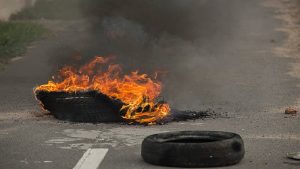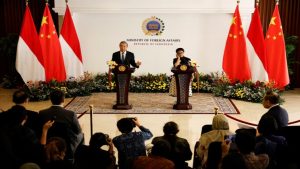Protests against China’s heavy COVID-19 curbs spread to more cities, including in the financial hub Shanghai early on Sunday, nearly three years into the pandemic, with a fresh wave of anger sparked by a deadly fire in the country’s far west.
The fire on Thursday that killed 10 people in a high-rise building in Urumqi, capital of the Xinjiang region, has sparked widespread public anger as many internet users surmised that residents could not escape in time because the building was partially locked down, which city officials denied.
The fire, and a denial by authorities that COVID measures had hampered escape and rescue, has fuelled a wave of civil disobedience unprecedented in mainland China since Xi Jinping assumed power a decade ago.
In Shanghai, China’s most populous city, residents gathered on Saturday night at the city’s Wulumuqi Road – which is named after Urumqi – for a candlelight vigil that turned into a protest in the early hours of Sunday.
As a large group of police looked on, the crowd held up blank sheets of paper – a protest symbol against censorship. Later on, they shouted, “lift lockdown for Urumqi, lift lockdown for Xinjiang, lift lockdown for all of China!”, according to a video circulated on social media.
At another point a large group began shouting, “Down with the Chinese Communist Party, down with Xi Jinping”, according to witnesses and videos, in a rare public protest against the Chinese leadership.
The police tried at times to break up the crowd.
China is battling a surge in infections that has prompted lockdowns and other restrictions in cities across the country as Beijing adheres to a zero-COVID policy even while much of the world tries to coexist with the coronavirus.
While low by global standards, China’s case numbers have hit record highs for days, with nearly 40,000 new infections reported by health authorities on Sunday for the previous day.
China defends Xi’s signature zero-COVID policy as life-saving and necessary to prevent overwhelming the healthcare system. Officials have vowed to continue with it despite the growing public pushback and its mounting toll on the world’s second-biggest economy.






